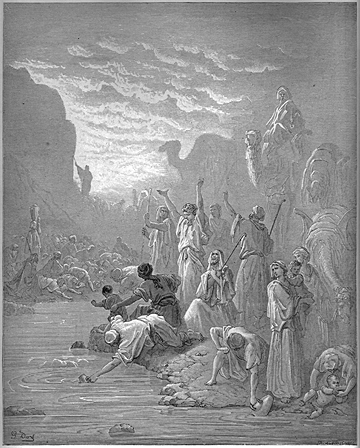Potdohbu 17
1 Pakai thupeh bang in Israel chate abonchauvin Sin gammang akon in akitol uvin mun khat akon munchom khat'a akitol leuvin ahi. Rephidem kiti mun'na ngahmun akisem'uvin hinlah hiche lai mun'na chun twidon ding aumta pon ahi.
Then all the Israelites left the Desert of Sin, going from place to place as they followed the Lord's commands. They camped at Rephidim, but there wasn't any water for the people to drink.
2 Mipi jong Mose heng'a avel lin a phunchel kit tauvin, “Don ding twi neipe uvin,” ati tauve. Mose'n a donbut in ajah uva, “Ipi ding'a kei koma ki phin'a na hiuvem? Chule ipi ding'a nang hon Pakai na patep u ham?”
Some of them came and complained to Moses, saying, “Give us water to drink!” Moses replied, “Why are you complaining to me?” Moses asked. “Why are you trying to challenge the Lord?”
3 Mipihon twi angaicha jing uvin Mose dounan thu aseijun akiphin gam tauvin, “Ipi ding'a Egypt gamsung'a kon'na nei hin puidoh mong mong'u hitam? Nangman keiho le, ka chate'u chule ka gan chate'u ka boncha uva dangchah'a thigam sah ding nei got uva hitam?” tin asei uve.
But the people were so thirsty for water there that they went on complaining to Moses, saying, “Why did you have to bring us out of Egypt? Are you trying to kill us and our children and livestock by thirst?”
4 Chuin Mose jong Pathen heng'a kap pum'in ataovin, “Hiche miteho ding'a ipi kabol ding hitam? Song'a selih ding eigo tauve,” ati.
Moses cried out to the Lord, “What am I going to do with these people? A bit more of this and they're going to stone me!”
5 “Chuin Pakaiyin Mose heng'a aseijin, “Mipiho ma'sang a konchun ki khen doh tem'in chule Nile vadung San najepna tenggol chu kichoiyin lang Israel upa ho phabep kipuijin.”
The Lord told Moses, “Go ahead of the people, and take some of the elders of Israel with you. Take with you the walking stick you used to hit the Nile, and just go on ahead.
6 “Keiman Sinai molsang songpi chungvum'ma ka dinpi ding nahiye, chuteng songpi chu jep lechun twi hung kikho doh jeng ding, Israel miten adon thei diu ahitai,” ati.
Look, I will stand there beside you by the rock at Horeb. When you hit the rock water will pour out for the people to drink.” So Moses did this as the elders of Israel watched.
7 Mose'n jong hiche mun chu Massah asah tan ahi (hichu ‘patepna’ tia kihe ahi) Chule Maribah (hichu ‘ki khoh doh’ tina ahi) ajeh chu Isreal mite Mose heng'a aphunchil uva, Pakai doumah jing asei doh uvin, “Na Pakaiyin keiho hikoma hi ei umpi mong uva hinam?” atiuvin ahi.
He called the place Massah and Meribah because the Israelites argued there, and because they challenged the Lord, saying, “Is the Lord with us, or not?”
8 Israel mite Rephidim mun aum jinglai yun, Amalek mite ahung kon uvin akisat petauve.
Then some Amalekites came and attacked the Israelites at Rephidim.
9 Chuin Mose'n jong Joshua heng'a thupeh aneiyin, “Amalek mite toh kisat ding pasal galsat ding phabep khat lheng doh tem'in. Jing nikho le keima gamlah molsang'a ka din ding hichea chu Pathen bantha hat ka dopsang'a ka pan ding ahi,” ati.
Moses told Joshua, “Choose some of men and go out and fight the Amalekites. Tomorrow I'll stand on the top of this hill holding the walking stick of God.”
10 Mose thupeh bang'in, Joshua'n jong Galsat ding pasal phabep alheng doh tan Amalek mite chu gal akisat pi tauvin ahi. Chuin Mose, Aaron leh Hur amaho cheng chu gam lah molsang lam'a akal tou tauvin ahi.
Joshua did what Moses told him and fought the Amalekites, while Moses, Aaron, and Hur climbed to the top of the hill.
11 Mose'n akhut teni a dopsang chan in Israel mite ahat be cheh jiuvin, chule akhutteni akham teng le vang Amelek mite ahat jita uvin ahi.
As long as Moses held up the walking stick his hands, the Israelites were the ones winning, but when he lowered them, it was the Amalekites.
12 Mose khut teni chu ahung khaam tan ahile aman jong adomsang joutapon chuin Aaron le Hur'in jong akhut ngap nading'in song ahol le hontan, a khut teni chu song chung'a angam lhan toumun in nilhum keijin akhut chu chol lou helin a domsang thei tan ahiye.
So when Moses' hands became heavy, the others took a stone and put it under him for him to sit on. Aaron and Hur stood on each side of Moses and held his hands up. In this way his hands were kept firmly up until the sun went down.
13 Ajonan Joshua le agalsat mihon Amelek mite chu ajoutaovin ahi.
As a result Joshua defeated the Amalekite army.
14 Gal ajo phat uvin, Pakaiyin Mose heng'a aseijin, “Het jing na ding'in lekhajol khat lanlang hiche gal kisat chung chang thuhi sunlut'in lang Joshua nabeng'a avella nasim peh tan: vannoiya Amalek kihetna kiti keiman kasuh mang hel ahitai,” ati.
The Lord told Moses, “Write all this down on a scroll as a reminder and read it out loud to Joshua, because I'm going to completely wipe out the Amalekites so nobody on earth will remember them.”
15 Mose'n jong hiche lai munna chun maicham asem in, “YAWEH-NISSI” (Pakai chu kaponlop ahi) tin asah tai.
Moses built an altar and called it “the Lord is my banner of victory.”
16 Aman aseijin, “Amalek mite'n Pakai doumah'a chon masao ahin, tunvang! Pakaiyin imatih channa Amalek mite akidou peding ahitai,” ati.
“Hold up the victory banner of the Lord!” Moses declared. “The Lord will go on fighting the Amalekites for all generations!”





















